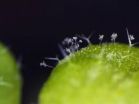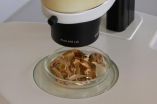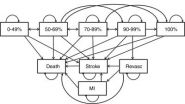(Press-News.org) Loyal consumers can earn benefits such as frequent flyer miles or free nights at hotels when they participate in rewards programs. Loyalty, of course, doesn't increase the odds of winning random prizes or receiving random discounts. According to a new study in the Journal of Consumer Research, consumers who have shown loyalty to a company giving a random reward mistakenly believe they are more likely to receive the reward because they deserve it.
"Even though prior effort or patronage does not increase the actual likelihood of a consumer receiving promotional discounts or winning sweepstakes and prize giveaways, higher levels of loyalty affect how likely consumers think they are to receive random rewards," write authors Rebecca Walker Reczek (Ohio State University), Kelly L. Haws (Vanderbilt University), and Christopher A. Summers (Ohio State University).
The authors conducted five studies to examine what they term the "lucky loyalty" effect. In one study, consumers were paid to complete small tasks online and told they would be entered into a random drawing for a $50 gift card as a special reward for their efforts. Consumers who felt they had invested more effort in completing the tasks believed they were more likely to win the gift card.
Consumers who have shown exceptional loyalty may find random prizes especially appealing and believe their chances of winning are greater. For example, consumers who have been buying lottery tickets for years may think they have a higher chance of winning than the occasional lottery ticket buyer. Loyal HGTV watchers may think they are more likely to win the HGTV Dream House Giveaway promotion because they are more deserving. Companies should be aware that reminding consumers of their loyalty could increase expectations of special treatment, even random special treatment.
"Although it is not surprising that loyal customers expect special treatment, our research shows that these expectations carry over to outcomes that are not influenced by one's past purchases because they are truly random. Consumers appear to believe they can earn 'unearnable' outcomes through effort even when the effort and outcome are unrelated," the authors conclude.
INFORMATION:
Rebecca Walker Reczek, Kelly L. Haws, and Christopher A. Summers. "Lucky Loyalty: The Effect of Consumer Effort on Predictions of Randomly Determined Marketing Outcomes." Journal of Consumer Research: December 2014. For more information, contact Rebecca Walker Reczek (reczek.3@osu.edu) or visit http://ejcr.org/.
Lucky loyalty? Devoted consumers believe they have earned the right to win random rewards
2014-09-16
ELSE PRESS RELEASES FROM THIS DATE:
Good networkers make prime targets
2014-09-16
Proteins are responsible for practically all vital functions in an organism. For example, they catalyze metabolic reactions, forward signals, transport particular substances and control immune system responses. Researchers established some years ago that proteins do not function independently of each other, but instead form complex networks.
"When you examine the protein networks, you find many similarities with online social networks," says Dr. Pascal Falter-Braun from TUM's Chair of Plant Systems Biology. "Some proteins are good networkers that maintain contact with ...
Cancer-fighting cocktail demonstrates promising results as treatment for advanced cervical cancer
2014-09-16
DALLAS – September 15, 2014 – Combining a standard chemotherapy drug with a second drug that stops cells from dividing improves both the survival and response rates for those with advanced cervical cancer, a new study by UT Southwestern Medical Center cancer researchers finds.
The cancer-fighting cocktail, which combines the chemotherapy drug cisplatin with pemetrexed - an agent that stops cancer cells from dividing - showed promising results for advanced, persistent, or recurrent cervical cancer.
"We found that pemetrexed combined with cisplatin is less toxic, well ...
Caving to cravings? Indulging in junk food linked to lapses in brain function
2014-09-16
Overindulging in high-calorie snacks is partly caused by lapses in a very specific part of the brain, according to a new University of Waterloo study.
The study, published in Psychosomatic Medicine: Journal of Biobehavioral Medicine, is the first to conclusively link reduced operation of the dorsolateral prefrontal cortex with self-restraint in the dietary context.
"It has long been thought that the dorsolateral prefrontal cortex helps to keep automatic, or knee-jerk, reactions in check," said Professor Peter Hall, senior author on the study. "We discovered that when ...
Powerful synergies across different sectors improve health of poor women and children
2014-09-16
New studies have uncovered the specific interventions and advances that have led to the success with these at-risk populations in the poorest countries.
New research across 142 countries finds that some 50 percent of the reduction in under-five child mortality in those countries is attributable to high impact health interventions such as early immunizations and skilled birth attendance.
The remaining 50 percent is due to factors outside the health sector, such as girls' education, women's participation in politics and the workforce, reduction of fertility rates, access ...
A new therapeutic target may prevent blindness in premature babies at risk of retinopathy
2014-09-16
This news release is available in French. According to a study conducted by pediatricians and researchers at Sainte-Justine University Hospital Research Center (Sainte-Justine) and Université de Montréal published online in the prestigious medical journal Nature Medicine on September 14, 2014, the activation of a receptor that migrates to the nucleus of nerve cells in the retina promotes the growth of blood vessels. The finding opens the possibility of developing new, more selective drugs to control the abnormal growth of blood vessels and prevent blindness including ...
What's for dinner? Rapidly identifying undescribed species in a commercial fungi packet
2014-09-16
For lovers of wild foods, autumn harks a season of bounty. Fungi of dizzying variety erupt from wood and soil, luring intrepid collectors to woodlands in search of elusive but delectable wild mushrooms. Part of their appeal lies in the allure of the treasure hunt, and their mysterious not-quite-meat, not-quite-vegetable qualities that belie an almost otherworldly existence. But are the mushrooms which you are eating known to science?
The Fungi Kingdom is enormously diverse yet vastly underdocumented – although some estimates range up to 10 million species, only about ...
Imaging identifies asymptomatic people at risk for stroke
2014-09-16
OAK BROOK, Ill. – Imaging can be a cost-effective way to identify people at risk for stroke who might benefit from aggressive intervention, according to a new modeling study published online in the journal Radiology.
The study looked at people with asymptomatic carotid artery stenosis, a narrowing of the major blood vessels supplying blood to the head due to atherosclerosis, or plaque buildup. Carotid artery stenosis is the primary cause of up to 20 percent of ischemic strokes, which result from an obstruction within a blood vessel and make up 85 percent of all strokes. ...
Researchers debunk myth about Parkinson's disease
2014-09-16
Using advanced computer models, neuroscience researchers at the University of Copenhagen have gained new knowledge about the complex processes that cause Parkinson's disease. The findings have recently been published in the prestigious Journal of Neuroscience.
The defining symptoms of Parkinson's disease are slow movements, muscular stiffness and shaking. There is currently no cure for the condition, so it is essential to conduct innovative research with the potential to shed some light on this terrible disruption to the central nervous system. Using advanced computer ...
Dental and nutrition experts call for radical rethink on free sugars intake
2014-09-16
Sugars in the diet should make up no more than 3% of total energy intake to reduce the significant financial and social burdens of tooth decay, finds new research from UCL (University College London) and the London School of Hygiene & Tropical Medicine.
The study, published in the open-access journal BMC Public Health, analysed the effect of sugars on dental caries, also known as tooth decay. They show that sugars are the only cause of tooth decay in children and adults.
Free sugars are defined by the World Health Organisation Nutrition Guidance Adivisory Group as follows: ...
Collaboration drives achievement in protein structure research
2014-09-15
When this week's print issue of the journal Science comes out, a collective cheer will go up from New Mexico, Montana and even the Netherlands, thanks to the type of collaborative effort that is more and more the norm in these connected times. Yes, the research was brilliant, and if we're lucky, it will produce innovations in biology, medicine, biotechnology and agriculture. It could save lives, and it happened because this scientist talked with that one, that one knew another one, and brilliant minds overcame geographic distance to advance human understanding.
"It is ...




